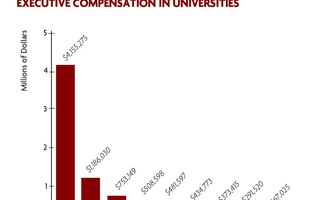A pair of studies from Harvard Medical School researchers published last week highlight the risks and costs of missing sleep. One of the two studies explores productivity losses due to insomnia, while the second analyzes the health effects of sleeping too little.
INSOMNIA COSTS $63 BILLION
An HMS study published last week in the journal Sleep, found that insomnia causes sizable productivity losses for the American economy. Researchers analyzed data from the 2008-2009 American Insomnia Survey, specifically focusing on 7,428 employed or self-employed respondents aged 18 or older.
The study found that on average, those who suffered from insomnia where no more likely to miss a day of work altogether, but that their overall losses in productivity amounted to 7.8 days worth of lost work per work year.
The researchers estimated that this productivity decline translated to an annual loss of $2,280 per worker suffering from insomnia, or $63 billion per year in the larger American economy.
Study author Ronald C. Kessler, a Health Care Policy professor at HMS, said that the study attempts to illustrate the costs to employers of not providing adequate health care coverage to workers.
He said that while employers often ask how they can afford to provide coverage, “Studies of this kind ask the question, ‘How can you afford not to?’”
He added that the study indicated that insomnia treatments could be a “low-hanging fruit” for employers who could stand to reap much larger gains in productivity than losses in additional health care costs.
Insomnia is one of the most commonly reported sleep disorders, affecting approximately 23 percent of the workforce, according to the survey.
SLEEP APNEA LINKED TO HYPERTENSION
A second study reveals that those struggling to get enough good quality sleep may now have another sleep-related malady to worry about: high blood pressure, or hypertension.
A team of researchers including Harvard Medical School faculty members recently published findings indicating that those who spent the least time each night in slow-wave sleep were the most likely to develop hypertension.
In a typical night’s rest, slow-wave sleep, also known as deep sleep, accounts for about a quarter of one’s overall sleep time, or about 90 minutes to two hours of an eight-hour sleep cycle.
The study, published last week in the journal Hypertension, was conducted by examining 784 participants of a separate sleep study. The participants were all ambulatory men aged 65 or above.
Study author Susan S. Redline, a professor at Harvard Medical School, said that both sleep duration and quality are essential for avoiding disease among people of all age groups.
She noted that in a previous study she authored, which focused on children aged 16-19, subjects who awoke the fewest times in the course of the night had significantly lower blood pressure.
Director of the Division of Sleep Medicine at HMS Charles A. Czeisler ’74 said that, even when controlling for other factors like obesity, sleep disorders are the largest known cause of high blood pressure. Blood pressure falls during sleep, he explained, and patterns of disrupted sleep can prevent that nightly decline.
Redline said that the best ways to ensure an adequate amount of deep sleep, other than sleeping the requisite eight hours, are to avoid caffeine, alcohol, and cigarettes before bed and to set regular bedtimes and wake times.
She also warned that lack of sleep, which has been tied to weight gain and obesity, may be part of the reason for the dreaded “Freshman 15” weight gain.
—Staff writer Benjamin M. Scuderi can be reached at bscuderi@college.harvard.edu.
Read more in News
Hong Kong, Popular Harvard Square Joint, Approved for Longer HoursRecommended Articles
-
 Need a Study Guide?
Need a Study Guide? -
Minority Students Feel Safe AbroadMinority students take into consideration different factors compared to their white counterparts when deciding whether to study abroad, according to ...
-
All Lamonsters Are Created EqualA favorite study place for many Harvard students, Lamont Library is especially convenient because of its 24-hour availability throughout most of the week.
-
 Spud Supporters, Including a Governor, Defend Potatoes Following HSPH Study
Spud Supporters, Including a Governor, Defend Potatoes Following HSPH Study -
Small, Rural Hospitals See Lower Quality of CareHealth care services and survival rates at small, remote hospitals are significantly worse than at other hospitals, according to a study published today.
-
 Harvard Executives Earn More Than Their Massachusetts Counterparts
Harvard Executives Earn More Than Their Massachusetts Counterparts













